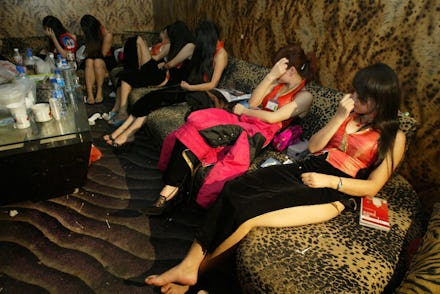What the Media Gets All Wrong About Sex Work

Earlier this month, a China TV report on prostitution throughout the city of Dongguan provoked the public's ire — but not for the reasons one might assume. Rather than chastising sex work itself, many critiqued the report for its portrayal of victimhood that denied agency to those who choose sex work.
"There has been a big change of opinion on this topic," Ye Haiyan, an activist and former prostitute, told Julie Makinen of the Los Angeles Times. "Before, people used to just criticize sex workers when such news was presented, but now people are more sensitive to how these workers survive, and also to how corruption contributes to it."
Haiyan's opinion questions how media coverage and legal language both use sex work ethics to contort a far more overarching problem: human trafficking.
While researching the French debate on prostitution, London-based Journalist Valeria Costa-Kostritsky was told, "For the [French Minister of Women's Rights], prostitution is to be considered mainly as a violent act, and that matters more than the unconditional right to exercise this profession." Maxime Ruszniewski-Bryner, press advisor to Minister Najat Vallaud-Belkacem, expanded on this statement by arguing, "in Sweden, where clients of prostitution have been criminalised since 1999, prostitution has decreased by half."
Image Credit: AP. French Minister for Women's Rights, Najat Vallaud-Belkacem (left)
Costa-Kostritsky has her own thoughts on Sweden's law. Her research sought to evaluate the country's choice to make buying sex a crime. Rather than being arrested for their profession, prostitutes working in Sweden are not criminally charged. If they wish to quit prostitution, they receive help from social services. Should they choose to continue their work, they are free to do so.
At face value, it seems ideal: By punishing johns rather than prostitutes, Sweden aims to offer sex workers more agency. But Costa-Kostritsky sees this as simplification of sex work discourse that obscures a much larger issue — a decrease in safety and increase in stigma that obscures the global trafficking industry.
"Have a look at big lobbies like Coalition against Trafficking in Women (CATW) and European Women Lobby," Costa-Kostritsky said in an interview. "I think they're basically using the fact that trafficking exists and the fact that it is horrible and little known to encourage more repressive laws against sex work."
Image Credit: AP. A sex worker in Amsterdam's red light district.
Is there a difference between trafficking and sex work? The latter — a synonym for prostitution — is generally defined as "the commission by a person of any natural or unnatural sexual act, deviate sexual intercourse, or sexual contact for monetary consideration or other thing of value." Human trafficking, by contrast, is defined by the UN as "the recruitment, transportation, transfer, harbouring or receipt of persons, by means of the threat or use of force or other forms of coercion, of abduction, of fraud, of deception, of the abuse of power or of a position of vulnerability or of the giving or receiving of payments or benefits to achieve the consent of a person having control over another person, for the purpose of exploitation."
And therein lies the problem: Sex work and slavery are often framed by the media as synonyms with the same gendered connotation. Although prostitution can be an abusive example of "a person having control over another person…" this is not always the case. Likewise, "trafficking" is an umbrella term encompassing several means of abusive exploitation, of which sex is only one. Those who work in anti-trafficking say that this distinction is essential to make.
"The media can do this by reporting more on labor trafficking," Karen McCrae, Provincial Program Coordinator at ACT Alberta, told PolicyMic. "If only sex trafficking is referred to, then women and girls will tend to be the only gender discussed. In addition, there seems to be a generalization that sex trafficking only impacts women and girls and that labor trafficking only impacts men," she adds. "The reality is that anyone can be impacted by any form of human trafficking, and that often the lines between sex and labor trafficking are indistinct."
Image Credit: AP. French women protesting for the abolition of prostitution.
Human trafficking is world's the fastest-growing organized crime. The 21 million people who live in slavery are part of an industry that sees $32 billion in annual revenue. Of those 21 million, 4.5 million are held for sex, generating $10 billion in global annual profits. To frame all prostitution as slavery — and all human trafficking as female sexual slavery — does nothing to bring these 21 million people home.
"Trying to increase ratings by publishing horrifying stories of 'sex slavery' is unethical and salacious," McCrae argues. "If reporters focus only on when human trafficking charges are laid, we miss the opportunity to raise awareness of human trafficking in all its forms, including labor trafficking and trafficking of men and boys. Since virtually all human trafficking charges are related to the sex trafficking of women and girls, this is what the general public tends to associate with human trafficking."
It's an association that needs to be shattered. The fact that humans are still bought and sold as property today should make everyone's skin crawl. But global media and governments that mask this larger challenge with gendered sex work ethics should address their own bias before offering solutions.